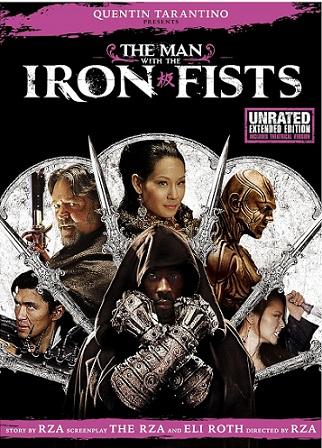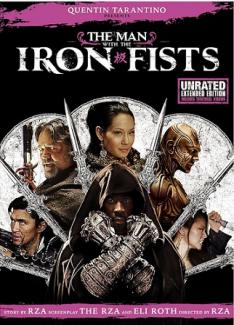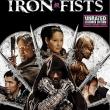Kung fu, herring fishing and Hudson with Day
The Man with the Iron Fists (2012, Universal, DVD, R/NR, 96/108 min.). This was the first film directed by RZA, leader of the hip-hop group Wu-Tang Clan. It was based on his own script, written with Eli Roth (the “Hostel” series), and he stars in the film as the Blacksmith, who made the deadly weapons used in the film and ultimately became the one with two iron fists. The Blacksmith also is the film’s narrator. The over-stuffed film comes with both the theatrical version and a 12-minute longer extended cut, plus 24 minutes of deleted scenes.
There are a couple of deaths and a mass fight during the opening credits, all the action taking place in Jungle Village. Gold Lion (Kuan Tai Chen of “Bloody Monkey Master”) is given the mission to safely transport 50,000 taels of Imperial gold, intended for famine victims. However, Gold Lion is betrayed by his lieutenants, Silver Lion (Byron Mann of “The Big Short,” “Skyscraper”) and Bronze Lion (Cung Le of “The Grandmaster,” “Tekken”), who take the gold after killing Gold Lion. Now Zen Yi, the X-Blade (Rick Yune of “The Fast and the Furious,” “Olympus Has Fallen,” “Die Another Day”), Gold Lion’s favorite son, is out to avenge his father’s death.
Meanwhile, Silver Lion wants to attack the Wolf Clan and the mysterious Jack Knife (Russell Crowe of “Gladiator,” “L.A. Confidential,” “Les Misérables”) shows up at the Pink Blossom and orders a room and three women. Jack Knife, who claims to be on vacation, fights Crazy Hippo (Gang Zhou) for one of the women. The whorehouse is run by Madam Blossom (Lucy Liu of “Charlie’s Angels,” “Kill Bill: Vol. 1,” “Chicago”). There is far too much of Jack Knife’s sex antics.
Zen Yi stops at an inn where rats eat off the tables and is attacked by The Ten Rodents, whom he defeats. Later, Zen Yi has a highlight fight with Brass Body (David Bautista of the “Guardians of the Galaxy” series) – yes, his body can turn to brass (with no explanation). Another exceptional battle occurs when the women of the Pink Blossom take on one of the male groups with deadly purpose.
Some of the film’s fight choreography momentum is derailed by a lengthy look at the Blacksmith’s backstory, which goes back to slavery in the United States, and gives Pam Grier an appearance as his mother.
Towards the end of the film, the picture often is divided into two or three segments, and the closing credits contain a scene that sets up a sequel, which was released in 2015.
In addition to the deleted scenes, which including a lengthy one of Gold Lion’s journey, there is a look inside the film (2:03), on filming in China (2:28) and a five-part look at RZA on set (5:12). Grade: film 2.5 stars; extras 2.25 stars
Rating guide: 5 stars = classic; 4 stars = excellent; 3 stars = good; 2 stars = fair; dog = skip it
Jakoman & Tetsu (Japan, 1964, 88 Films, Blu-ray, NR, 99 min.). This film is the second film of that name made from a script by acclaimed future director Akira Kurosawa (“Ran,” “The Hidden Fortress”) and Senkichi Taniguchi, who also directed the first version in 1949. The black-and-white film is full of how fishermen and their nets prepared for the brief herring run in 1946 post-war Japan, when even criminals were hired to work the boats. This version of the story is directed by Kinji Fukasaku (“Battle Royale,” “Fall Guy”).
The tale centers on a fish company, on the shore of the snowy northern island of Hokkaido, run by Kyubei (Isao Yamagata of “Seven Samurai”), who has made an enemy of one-eyed Jakoman (Tetsuro Tanba of “Three Outlaw Samurai,” “You Only Live Twice”) by stealing his unlicensed boat and leaving him for dead. Jakoman has shown up as a worker, yet does no work but rather instigates fights and discontent among the workers. Jakoman does not want money nor his boat back, he just wants to see Kyubei “cry tears of blood.”
Into the mix comes Tetsu (Ken Takakura of “Black Rain,” the Abashiri Prison series), Kyubei’s beloved son who was a sailor during the war and had been presumed dead. While initially an adversary to Jakoman, eventually a respect grows between the two men. Tetsu also helps Yuki (Hizuru Takachiho of “Zero Focus”), who has been chasing Jakoman for three years in the hope they will marry.
The film comes with audio commentary by Tom Mes and Jasper Sharp, an introduction by Marck Shilling (18:21), a stills gallery (1:92) and a 16-page booklet with an essay by Chris D. Grade: film 3 stars; extras 2.5 stars
Lover Come Back (1961, Universal, Blu-ray, NR, 106 min.). Rock Hudson plays a womanizer, who pretends to be someone else so he can woo Doris Day’s character, a somewhat similar plot to what they played in “Pillow Talk.” Here, both are New York City advertising campaign managers. Day is Carol Templeton, who highly resents it when Jerry Webster (Hudson) of a rival firm snatches a client she has worked hard to prepare. Jerry has taken him to a nightclub and plied him with alcohol and beautiful women, including Edie Adams (“The Apartment,” “It’s a Mad Mad Mad Mad World”) as Rebel Davis. Jerry works for the seldom-at-the-office millionaire Peter Ramsey (Randall), who frequently mentions that his psychiatrist (Richard Deacon of TV’s “Leave It to Beaver,” “The Dick Van Dyke Sow” as Dr. Melnick) wants him to make decisions.
Pressed at one point by a girlfriend, Jerry makes up a VIP account and has commercials shot with her of the non-existent product. However, while Jerry is on a hunting vacation in Canada – some fun involving a moose and growing a beard – a finally-take-charge Peter orders the commercials to saturate television. Jerry then has to convince disgraced scientist Dr. Linus Tyler (Jack Kruschen of “The Apartment,” “War of the Worlds”) to create a VIP product. Tyler’s efforts are often explosive.
Meanwhile, Carol has learned of VIP and tries to hire Dr. Tyler to work for her, only she mistakes Jerry for the scientist when they meet at Tyler’s lab. Impressed with Carol’s looks, Jerry extends the deception and the two fall in love – until Carol learns she has been played in the rather rushed ending.
Among the lies Jerry makes up is a doctor brother who was eaten by cannibals in Africa. Director Delbert Mann (Oscar winner for “Marty”) has several clever scenes. In one, Carol and Jerry, pretending to be Tyler, talk about trust, while in the background fish tank, a giant fish on Jerry’s side swallows whole a small fish from Carol’s side. Then the next day after Carol takes Jerry as Tyler to a strip show, where he ends up with the two large daisies the stripper was using to cover up, Carol is wearing a hat that has small daisies on it. There also is a running joke of two male bystanders always commenting on Jerry’s success with women. One of the two is played by Jack Albertson (“The Poseidon Adventure,” “Willy Wonka and the Chocolate Factory”).
Ann B. Davis (TV’s “The Brady Bunch,” “The Bob Cummings Show”) plays Carol’s secretary Millie and Joe Flynn (TV’s “McHale’s Navy,” see below) plays Hadley, who works for Ramsey. The film’s screenplay earned an Oscar nomination and Randall was nominated for a Golden Globe. Grade: film 3.5 stars
EDtv (1999, Universal, Blu-ray, PG-13, 123 min.). Matthew McConaughey stars as Ed Pekurny in this satire of reality TV, directed by Ron Howard (“Apollo 13,” “The Da Vinci Code,” “How the Grinch Stole Christmas”). Ed, 31, is just a regular guy who gets chosen for True TV’s new 24/7 series when he appears in his brother’s audition tape. Said brother is Ray, played by Woody Harrelson (TV’s “Cheers”), who brings much humor to the film. Ed works in a video store.
Ray services video, has a girlfriend in Shari (Jenna Elfman of TV’s “Dharma & Greg”), whom he does not treat well, and plans to open his own gymnasium. When Ed gets the show gig, Ray plans having plugs for the gym in the show. The big twist is that Ed and Shari start dating, hard as that is as Ed has at least two cameras following him all the time. Eventually, the hate from the TV viewers gets to Shari, making her want to retreat from the relationship.
The broad satirical strokes deal with the TV network – run by Whitaker (Rob Reiner of “This Is Spinal Tap,” TV’s “All in the Family”), with Cynthia (Ellen DeGeneres of TV’s “Ellen,” “The Ellen DeGeneres Show”) the producer and show’s originator – and the reaction of viewership, which carries over to crowds following Ed in the streets.
As already indicated, the cast is topnotch and also includes Sally Kirkland (“JFK,” “The Sting”) as Ed’s mom Jeanette, and Martin Landau (“North by Northwest,” “Ed Wood,” TV’s “Space: 1999,” “Mission: Impossible”) as Ed’s stepdad Al. Dennis Hopper (“Easy Rider,” “Blue Velvet”) has a smaller role as Hank, Ed’s biological father, and Elizabeth Hurley (“Bedazzled,” “Austin Powers: International Man of Mystery,” TV’s “The Royals”) plays Jill, who is either trying to be Ed’s next girlfriend or work her way into showbusiness.
Adding to the show’s sense of realism are these familiar faces playing themselves, mostly in cameos: RuPaul, Harry Shearer, Bill Mahar, Jay Leno, Michael Moore and George Plimpton.
There is fun to be had in the film, which takes a different approach to the subject than does the previous year’s “The Truman Show,” in which Jim Carrey’s character did not know he was being filmed and broadcast.
Extras include two audio commentaries: one by director Howard; the other by screenwriters Lowell Ganz and Babaloo Mandel. The main idea of someone’s life being broadcast came from a small French-Canadian film. There also is a making-of featurette (31:24); deleted scenes (40:45); and outtakes, mostly Harrelson flubs (7:55). Grade: film 3.5 stars; extras 3.25 stars
McHale’s Navy (1964, Universal, DVD, NR, 92 min.). Based on the successful TV series that ran from 1962 to 1966, the film wisely uses much of the same cast, including Ernest Borgnine (“Marty,” “The Poseidon Adventure”) as Lt. Cmdr. Quinton McHale, Tim Conway (TV’s “The Carol Burnett Show”) as bumbling Ensign Charles Parker and Joe Flynn (“The Computer Wore Tennis Shows”) as foil Captain Wallace B. Binghamton. Also repeating their roles are Carl Ballantine as torpedoman Lester Gruber, Billy Sands as motor machinist Harrison “Tinker” Bell, Gavin MacLeod as seaman Joseph “Happy” Hanes and Yoshio Yoda as Japanese prisoner of war Fuji Kobiaji.
McHale has been running weekly betting on horse races to benefit the St. Terese Orphanage, which he and his men visit at the start of the film. However, when a popular betting horse wins an Australian race, McHale and his men do not have the money to cover their loses. So, when they find the winning race horse stranded on an island, they bring it back on PT-73 and decide to enter it in an upcoming race, disguised as some kind of wooly horse. POW Fuji has to be their jockey. They also need extra cash because Ensign Parker has destroyed a wharf and supply of coffee beans.
The owner of the Casino Royale, Margot “Maggie” Monet (Jean Willes), has offered to cover the debt, but only if McHale marries her, something he wants none of. The film’s funniest bits involve Ensign Parker vs. Capt. Binghamton. The crew made one more movie together, “McHale’s Navy Joins the Air Force” (1965). Grade: film 3 stars
Never Too Young to Die (1986, SP Releasing, DVD, R, 96 min.). John Stamos, then 23 and two years after his stint on TV’s “General Hospital” and a year before “Full House,” plays high school gymnast Lance Stargrove who tries to track down his spy father’s killer. Dad Drew Stargrove is played by former James Bond George Lazenby (“On Her Majesty’s Secret Service”). He is helped by his gadget-creating dorm roommate Cliff (Peter Kwong of “Big Trouble in Little China,” “Gleaming the Cube”) and, eventually, his father’s partner/lover Danja Deering (Prince protégé Vanity of “Action Jackson,” “The Last Dragon”).
Bad guy Velvet Von Ragnar (rocker Gene Simmons of KISS) is a very campy hermaphrodite – half-man, half-woman – who has figured out how to access system computers to re-channel radioactive waste so it goes from Diablo Canyon into the city’s drinking water. However, Drew Stargrove has taken the computer disc and hidden it somewhere. Ragnar also performs sort-of rock at a bar called The Incinerator. His bad guys all look like “Mad Max” rejects, with plenty of motorcycles.
Drew’s action sequence comes early. After his death, Lance learns his father has left him a farm he knew nothing about, a farm with a secret basement lair filled with spy stuff. He also finds Danja there, gets to fight two guys and have the farm’s barn blow up.
Weirdly, Stamos looks sexiest when he is being beaten by a pair of Ragnar’s men. And while Simmons usually is too over-the-top, the scenes in which Danja comes on to Lance are way too inappropriate. Also, the film’s ending makes no sense. It was directed by Gil Bettman, producer of TV’s “Knight Rider,” “The Fall Guy” and “Automan.” Grade: film 2 stars
About this blog:

My music review column, Playback, first ran in February 1972 in The Herald newspapers of Paddock Publications in Arlington Heights, IL. It moved to The Camden Herald in 1977 and to The Courier Gazette in 1978, where it was joined by my home video reviews in 1993. The columns ran on VillageSoup for awhile, but now have this new home. I worked at the Courier Gazette for 29 years, half that time as Sports Editor. Recently, I was a selectman in Owls Head for nine years.



























